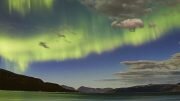Rights violation cases stood in a queue, but this week, Foreign Minister Børge Brende will still be visiting Russia for the first time since 2014.
On Wednesday, the Foreign Minister will meet his Russian counterpart, Sergej Lavrov, during an Arctic conference in Arkhangelsk in northern Russia.
‘ Not only is it very important that Børge Brende travels to Russia, this will be a meeting point, allowing for the type of normal diplomatic communication which is very necessary’, said senior researcher at the Norwegian Institute of International Affairs (NUPI), Julie Wilhelmsen.
‘The visit sends a signal to Russia that their country is not only a pariah’, she said.
‘The visit has a very important symbolic significance, not least because it comes after several years of a very intense situation, where Norwegian-Russian bilateral relations have become integral to the tension between Russia and the West.
In February, three news stories soured an already chilly relationship:
* Sosialistisk Venstreparti’s (SV) Bård Vegar Solhjell and Venstre (V) leader, Trine Skei Grande, were denied visas to Russia.
* The Police Security Service (PST) accused Russian intelligence services of attempts to hack important Norwegian institutions’computer systems.
* The Russian ambassador to Norway made a full-frontal attack on Norway’s Russia policy.
‘All this makes for a situation characterised by fairly intensive deterrence operations on both sides, and quite thin diplomatic contact and communication’, said Wilhelmsen.
The Norwegian Institute of International Affairs (NUPI) research shows three political decisions in Norway that have particularly provoked Russia.
The first is about “rotation based training” of US soldiers at Vaernes, the second that Norway is considering a contribution to the NATO missile shield, and thirdly, the Norwegian military training activities in Finnmark, near the border with Russia.
‘The Norwegian government sometimes has adopted a rather dismissive tone towards Russia. Norway can go forward now with a security policy where one can discuss whether one is about to leave the self-imposed restrictions of the Cold War’ behind, said Wilhelmsen.
Additionally, she thinks Lavrov will address NATO’s increased presence in the Baltic, and Eastern Europe, in which Norway participates, and perhaps the Western sanctions against Russia, which Norway also supports.
‘Russia’s is sure to read from this “complaint list” to Brende,’ said Wilhelmsen.
Ukraine-strife
Russia’s annexation of the Ukrainian Crimean peninsula three years ago, and Russia’s military intervention in eastern Ukraine,are behind the icey front between East and West.
‘Norway has condemned Russia’s continued occupation and illegal annexation of Crimea and Sevastopol. Russia’s behavior is a serious violation of international law, and challenges international order’, said Undersecretary Bernie Berger Røsland of Høyreparti (H) on the 18th of March.
Wilhelmsen thinks it is virtually inconceivable that Norway will give way on the sanctions list.
‘Since 2014, Norwegian politics has been primarily aimed at following the EU and NATO line, and not toward creating an independent Norwegian line, so you think about what is most important in our bilateral relations.
To create a more positive dynamic, she thinks Brende would do well to focus on areas where cooperation between Norway and Russia is good.
‘Norway and Russia have extensive cooperation, including that relating to nuclear safety, environment and fisheries in the north, the coast guard and border cooperation’, said Brende in his foreign policy address in Parliament recently.
Source: NTB scanpix / Norway Today



